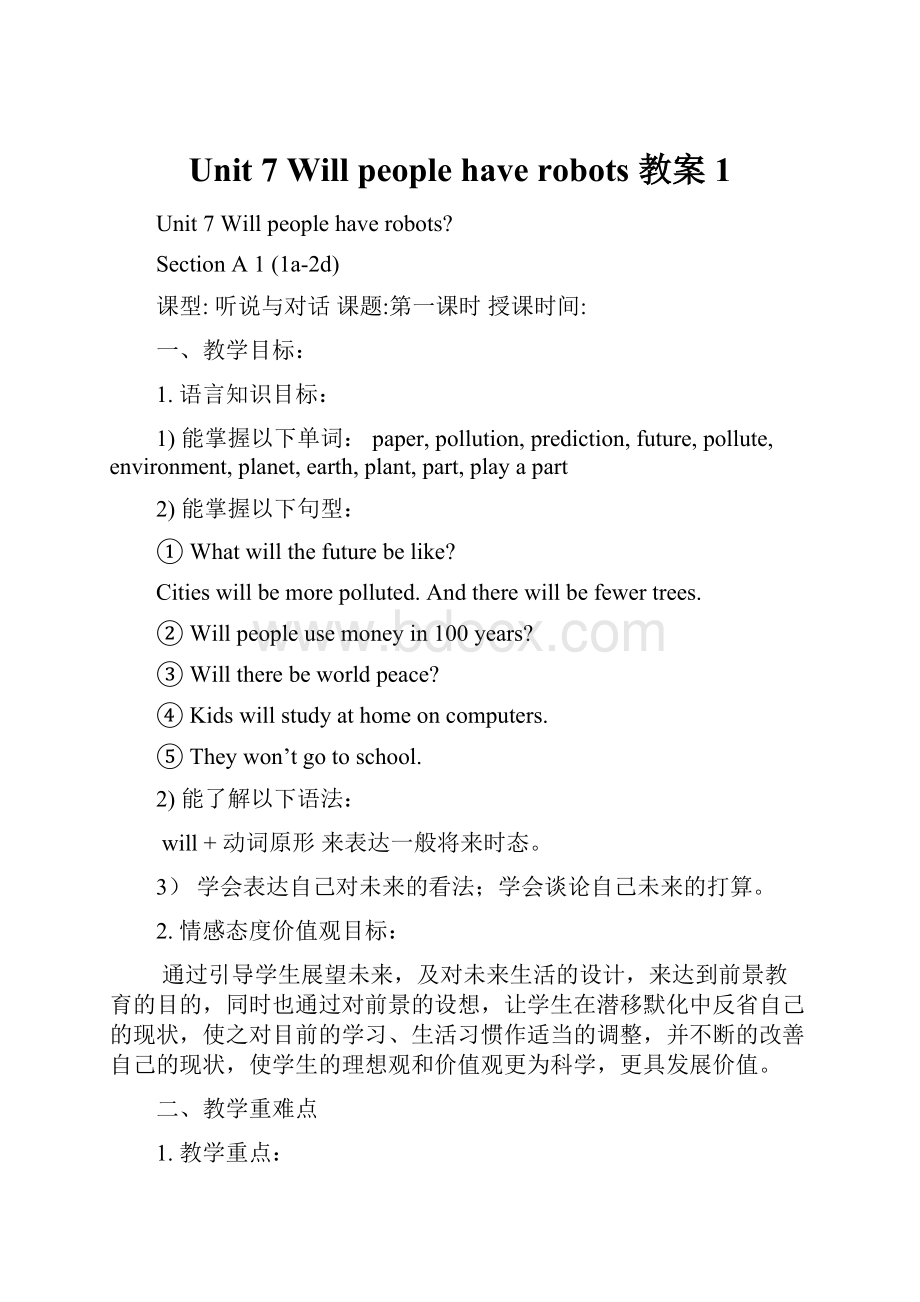Unit 7 Will people have robots 教案1.docx
《Unit 7 Will people have robots 教案1.docx》由会员分享,可在线阅读,更多相关《Unit 7 Will people have robots 教案1.docx(21页珍藏版)》请在冰豆网上搜索。

Unit7Willpeoplehaverobots教案1
Unit7Willpeoplehaverobots?
SectionA1(1a-2d)
课型:
听说与对话课题:
第一课时授课时间:
一、教学目标:
1.语言知识目标:
1)能掌握以下单词:
paper,pollution,prediction,future,pollute,environment,planet,earth,plant,part,playapart
2)能掌握以下句型:
①Whatwillthefuturebelike?
Citieswillbemorepolluted.Andtherewillbefewertrees.
②Willpeopleusemoneyin100years?
③Willtherebeworldpeace?
④Kidswillstudyathomeoncomputers.
⑤Theywon’tgotoschool.
2)能了解以下语法:
will+动词原形来表达一般将来时态。
3)学会表达自己对未来的看法;学会谈论自己未来的打算。
2.情感态度价值观目标:
通过引导学生展望未来,及对未来生活的设计,来达到前景教育的目的,同时也通过对前景的设想,让学生在潜移默化中反省自己的现状,使之对目前的学习、生活习惯作适当的调整,并不断的改善自己的现状,使学生的理想观和价值观更为科学,更具发展价值。
二、教学重难点
1.教学重点:
1)学习掌握一般将来时态的意义和结构。
2)掌握Therebe句型的一般将来时态的结构。
2.教学难点:
掌握more/fewer;more/less的用法。
情态动词will+动词原形来表达一般将来时态。
三、教学用具:
黑板录音机多媒体
四、教学方法:
Drills听说读写小组合作
五、教学过程:
Ⅰ.Lead-in
1.在大屏幕上向学生展示一些机器人的图片,让学生们说出谈论自己的未来的工作,对工作的打算等:
Whatdoyouwanttobewhenyougrowup?
Ss:
Iwanttobeascientist.
T:
Howareyougoingtodothat?
Ss:
I’mgoingtostudysciencehard.
….
2.学生们根据图片来引导出机器人这一话题。
Ⅱ.Presentation
1.引导学生们看大屏幕上的图片,根据图示来理解will来表达一般将来时态。
用一句话来让学生们明白一般将来时态:
I’mthirteenyearsoldnow.AndIwillbefifteenyearsoldintwoyears.
现在我十三岁,两年后我将是十五岁。
2.让学生们看大屏幕上图片,并让学生学习will+动词原形及won’t+动词原形的用法。
通过例句让学生们理解。
Ⅲ.Game
1.Howwillyourfuturebelikein100years?
Canyouseeanythingaboutit?
2.Ssdiscussandthinkabouttheirfuture.Thensaysomesentences.
e.g.Peoplewillhaverobotsattheirhome.
Therewillbeonlyonecountry.
Peoplewon’tusemoneyinthefuture.
…
(同学们如果自己想象不出来,可以根据大屏幕的图片提示来说句子。
)
4.Howwilltheworldbedifferent100yearsfromnow?
Readthepredictionsin1a.CheckAforagreeorDfordisagree.
SsreadthesentencesdiscussthemandcheckAorD.
Ⅳ.Listening
1.T:
Nowlistentotherecordingandcirclethepredictionsyouhearin1a.
2.PlaytherecordingfortheSstolistenandcirclethepredictions.
3.Playtherecordingagain.ChecktheanswerswiththeSs.
Ⅴ.Pairwork
1.LetSsreadthefirstconversationin1caftertheteacher.
2.ThenletSsaskandanswerquestionsaboutthepredictionsin1a.Thenmaketheirownconversation.
注意:
如果将陈述句变为一般疑问句,应将情态动词will提前到主语前便可。
3.Letsomepairsaskandanswerabouttheirconversations.
Ⅵ.Listening
Workon2a:
1.Readthesentencesin2a.TellSstheywilllistentosomesentences.Theyshouldlistenandcirclethewordsinthebracket.
2.PlaytherecordingfortheSstolistenandcirclethewords.
3.Playtherecordingagaintochecktheanswers.
Workon2b:
1.LetSsreadthesentencesbelow.ExplainsomemainsentencesfortheSs.Makesuretheyknowwhattodo.
2.PlaytherecordingfortheSstocheckthepredictionstheyhear.
3.Playtherecordingagaintochecktheanswers.
Ⅶ.Pairwork
1.TellSsaskandanswerquestionsaboutthepredictionsin2aand2b.
2.LetSsreadconversationin2cfirstaftertheteacher.
3.Sstalkaboutthepredictionswiththeinformationin2aand2b.
4.Asksomepairstoacttheirconversations.
Ⅷ.Role-play
1.Readtheconversationsandanswerthequestions:
1)Whatwillthefuturebelikeinthebook?
2)Whatcanpeopledo?
2.Explainsomenewwordsandmainpointsintheconversation.
beingreatdanger,movetootherplanets;playapart;
3.Readtheconversationaftertheteacher.
4.Practicetheconversationwiththeirpartner.Thenletsomepairstoactouttheconversation.
六、随堂检测练习:
七、家庭作业:
Homework:
1.Recitetheconversationin2dafterschool.
2.用下列词组来造句:
(1)bemorecrowdedandpolluted
(2)befewertrees(3)beingreatdanger(4)ontheearth(5)lesswater(6)playapart
3.Doworkbookexerciseof《全品作业本》P
八、板书设计:
九、教学反思:
SectionA2(GrammarFocus-3c)
课型:
听说与语法课题:
第二课时授课时间:
一、教学目标:
1.语言知识目标:
1)学习掌握下列词汇:
peace,sea,sky
2)进行一步复习巩固运用SectionA部分所学的生词和词组。
3)进一步学习运用所学的知识来陈述自己对将来的看法;学会谈论自己的对将来的预言。
4)掌握情态动词will来表达一般将来时态这一语法知识;
2.情感态度价值观目标:
通过引导学生展望未来,及对未来生活的设计,来达到前景教育的目的,同时也通过对前景的设想,让学生在潜移默化中反省自己的现状,使之对目前的学习、生活习惯作适当的调整,并不断的改善自己的现状,使学生的理想观和价值观更为科学,更具发展价值。
二、教学重难点
1.教学重点:
1)进一步学习运用所学的知识来陈述自己对将来的看法;学会谈论自己的对将来的预言。
2)掌握情态动词will来表达一般将来时态这一语法知识;并运用所学的知识来表达将来的活动。
2.教学难点:
掌握情态动词will来表达一般将来时态这一语法知识;
三、教学用具:
黑板录音机多媒体
四、教学方法:
Drills听说读写小组合作
五、教学过程:
Ⅰ.Warming-upandrevision
1.Haveadictationofthenewwordslearnedinthelastclass.
2.AsksomeSstogivesomepredictions.
T:
What’syourpredictionaboutthefuture?
S1:
Therewillbelessfreetime.
S2:
Therewillbemorepollution.
3.Role-playtheconversationin2d.
Ⅱ.GrammarFocus.
1.学生阅读GrammarFocus中的句②What______the____be_____?
子,然后做填空练习。
①将来会是什么样子?
城市污染将会更多。
且树木将会更少。
Cities____________polluted.Andthere________________.
③一百年后,人们会使用钱币吗?
____people____money___100years?
④不会的。
一切东西将会免费。
No,they______.Everything____________.
⑤世界将会有和平吗?
_______________worldpeace?
⑥是的,我希望如此。
Yes,I___________.
⑦孩子们将会在家中在电脑上学习。
Kids___________athome____________.
⑧他们将不会去上学?
They_____________toschool.
2.学生们根据记忆,看大屏幕来完成填空练习。
3.学生们完成填空试题后,可以打开课本检查答案,对错误的句子,单独进行强化记忆。
Ⅲ.TrytoFind
一、一般将来时态
肯定式:
主语+will+动词原形Kidswillstudyathomeoncomputers.
孩子们将会在家里的电脑上学习。
否定式:
主语+won’t+动词原形
Peoplewon’tusemoneyin100years.一百年后人们将不再使用钱币。
一般疑问句式:
Will+主语+其他?
肯定回答:
Yes,主语+will.否定回答:
No,主语+won’t.
人们将会有更多的空闲时间吗?
Willpeoplehavemorefreetime?
是的,会。
/不,不会。
Yes,theywill./No,theywon’t.
二、Therebe句型:
1.therebe句型表示客观存在的“有”(所有者不明确)。
例如:
有湖边有很多树。
____________manytreesnearthelake.
be动词有_____________两种形式。
2.be动词形式的确定要根据其后面的名词单复数形式来确定。
__________anappletreeinthepark.
___________manypeopleintheparktoday.
3.Therebe句型的一般将来时结构:
肯定式:
There+________+其他
否定式:
There+___________+其他
一般疑问句:
____________+be+其他?
答语:
Yes,therewill./No,therewon’t.
三、
可数名词
1.more+
不可数名词
2.less+不可数名词
3.fewer+可数名词
Ⅳ.Practice
Workon3a:
1.TellSstoreadtheconversationin3aandtrytofillintheblankswithmore/lessorfewer.
2.方法指导:
应通读整个对话,掌握对话大意;
然后,根据空格后的名词是可数名词还是不可数名词来确定是用more,less还是fewer。
注意,有些名词前有形容词来修饰。
3.最后,教师与同学们一起校对答案,并对学生们有疑问的地方进行解释。
4.学生们阅读这些句子并试着记住这些句子。
Workon3b:
1.让学生们阅读句子的开头,明白每个句子的意思。
2.让学生们思考一下针对这一情况,在将来会发生什么样的情况。
3.让学生们互相检查自己所写的句子,发现并改正错误。
4.让部分学生说一说自己所写的句子。
大家一起改正句子中的错误。
Ⅴ.Groupwork
1.小组中的同学们对未来的城市进行讨论。
2.每个成员发表自己的想法,小组长进行记录,并进行汇总。
3.最后,同学们根据小组成员的想法,然后,展开想象,试着每名同学们画一幅未来城市的画。
4.最后,比较一下每个小组的画,看哪个小组画得较好。
5.试着对自己小组里的情况用英语做成一个报告。
Ⅵ.Exercises
Iftimeisenough,dosomemoreexercisesonbigscreen.
根据下列表格的内容完成后面的句子:
GardenCity
now
In100years
600houses
1000houses
Alotofpollution
Almostnopollution
Sevenschools
Twoschools
2400people
3500people
Alotofsnow
Alittlesnow
Sixmovietheaters
Twomovietheaters
根据上面的表格用more,less,fewer填空。
Therewillbe__________house
Therewillbe__________pollution
Therewillbe__________schools
Therewillbe_________people
Therewillbe___________snow
Therewillbe________movietheaters
六、随堂检测练习:
用few,fewer,little,alittle,less,more填空
1Sheisfriendlytoothers,soshehasfriendsthanme.
2Don’tpourwastewaterintotheriver,andtherewillbepollution.
3andmorepeoplelikecomputers.
4Therewillbepeopleinthisvillage,becausemanyyoungpeoplearegoingtocitiestofindjobs.
5Therewillbemorerobotsinthefuture,sohumanswillhaveworktodo.
6Themorecarefulyouare,themistakes(错误)youwillmake.
7Westillhave(一点)timetodothework.
8Take(多的)exerciseandeat(少的)food,thenyou’llgethealthier.
9Heisnewhere,sohehas(几乎没有)friends.
10Thereis(几乎没有)foodathome.Pleasegoandbuysome.
七、家庭作业:
Homework:
1.复习GrammarFocus中的内容。
展开你想象的翅膀,想一下50年后,你的生活将会怎么样?
并写六个句子来描述一下。
Infiftyyears,…
2.Doworkbookexerciseof《全品作业本》P
八、板书设计:
九、教学反思:
SectionB11a-2e
课型:
听力与阅读课题:
第三课时授课时间:
一、教学目标:
1.语言知识目标:
1)能掌握以下单词:
apartment,rocket,space,spacestation,even,human,servant,dangerous,already,factory,simple,overandoveragain,believe,hundredsof,inside,disagree,shape,fall,falldown,lookfor,possible,impossible
2)能掌握以下句型:
①—Wheredoyoulive?
—Iliveinanapartment.
②Therearealreadyrobotsworkinginfactories.
③It’seasyforchildrentowakeupandknowwheretheyare.
④Thatmaynotseempossiblenow,butcomputersandrocketsseemedimpossible100yearsago.
3)能综合运用will表达一般将来时态。
2.情感态度价值观目标:
通过引导学生展望未来,及对未来生活的设计,来达到前景教育的目的,同时也通过对前景的设想,让学生在潜移默化中反省自己的现状,使之对目前的学习、生活习惯作适当的调整,并不断的改善自己的现状,使学生的理想观和价值观更为科学,更具发展价值。
二、教学重难点
1.教学重点:
1)掌握本课时出现的生词及表达方式。
2)进行听力训练,提高综合听说能力。
3)阅读短文,获得相关信息,提高学生们的综合阅读能力。
2.教学难点
1.听力训练
2.阅读2b部分的短文并完成相关要求。
三、教学用具:
黑板录音机多媒体
四、教学方法:
Drills听说读写小组合作
五、教学过程:
Ⅰ.Warming-upandrevision
1.Dailygreeting.
2.复习情态动词will构成的一般将来时态的构成。
3.复习more,fewer,less后面所跟名词的情况。
4.让学生们谈谈自己所画的未来城市的前景情况。
Ⅱ.Leadin
1.AskSssomequestions:
T:
Whatwilldointhefuture?
T:
Wherewillyoulive?
T:
Howwillyougotowork?
GetsomeSsthinkandanswerthequestions.
2.Presentsomenewwordsonthebigscreen.e.g.
apartment,rocket,space,spacestation,human,servant,factory…
3.ExplainsomemainwordstotheSs.Givesomeexamplesonthebigscreen.
simple,overandoveragain,believe,hundredsof,disagree,shape,fall,falldown,lookfor,possible,impossibleeven,dangerous,already
4.Workon1a.Writeeachwordinthecorrectcolumnbelow.
Ⅲ.Discussion
1.Workwithyourpartners.Thinkofotherwordsandwritetheminthechartin1a.
2.LetSsdiscussthewordsandwritetheminthechart.
3.LetsomeSsreadthewords.
Ⅳ.Listening
Workon1c:
1.TellSstolistento